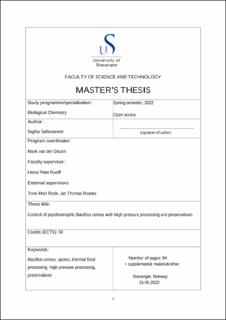| dc.description.abstract | Bacillus cereus are Gram-positive endospore-forming bacteria with a growth temperature range of 4-55 °C. The ability of psychrotrophic strains of B. cereus spores to survive pasteurization, grow at refrigerated conditions and cause food poisoning is a concern with regard to food microbiological safety. The main objective of this master thesis work was to obtain knowledge about B. cereus with relevance to inactivation spores with thermal, pressure-thermal treatment, and growth inhibition with preservatives.
Testing the psychrotrophic growth of the strain was the first experiment. Then, spores were heated in LB medium at 8 different combinations of temperatures (80 and 90 °C) and time in a water bath. The effect of thermal process on spores, as well as the decimal reduction times (D-values) were determined. The effect of Tween 20 on spore heat resistance and prevention of clump formation was studied. The growth of B. cereus was also tested in different types and concentrations of preservatives. Different concentrations of sodium chloride (NaCl), potassium chloride (KCl), sodium nitrite (NaNO2), and nisin as well as different levels of pH were applied to B. cereus to investigate the growth process of vegetative cells and spores. Spores were then heated in food matrices (minced meat and minced fish) at 85, 90, and 95 °C, and spore reductions were investigated. Finally, the effect of 6 different pressure-thermal process conditions was studied on spores in minced meat and minced fish.
The lowest growth temperature for this strain was determined as 5 °C. Heating spores in LB medium at 80 °C resulted in 1.9, 1.8, 3.0 and 2.9 log reductions after 5, 10, 15 and 20 minutes respectively. Heating spores in LB medium at 90 °C reduced spores by 2.2, 4.0, 5.1 and 5.2 logs after 2, 5, 8, and 10 minutes. D-values were determined as 7.1 min at 80 °C and 1.9 min at 90 °C. Adding 0.1% of Tween 20 to the washing solution, prevented spore clumping to a great extent without effect on the spore’s heat resistance. The growth experiment with preservatives revealed that the inhibitory effect of preservatives on both vegetative cells and spores was the same. In the presence of 25 µg/ml of nisin and pH 3 and 4, no growth was observed. The time to detection (TTD) was longer in 4% NaCl and KCl than in 1 and 2%. No change in growth was observed in the presence of all concentrations of NaNO2 and also in lower concentrations of nisin (15 and 7.5 µg/ml). When spores were heated in food matrices, the resulted log reductions were very similar in minced meat and minced fish. Spore population was reduced by 3.3 log in minced meat and 3.5 log in minced fish after heating at 95 °C for 5 minutes. Comparing the log reductions of spores heated in LB and food matrices, revealed that spores were more heat-stable in food matrices than in LB medium. Regarding the effect of pressure-thermal processing, in minced meat and minced fish, the highest log reductions of 3.2 and 3.3 were obtained respectively at processing conditions of 600 MPa, 55 °C, and holding time of 10 minutes. | |
